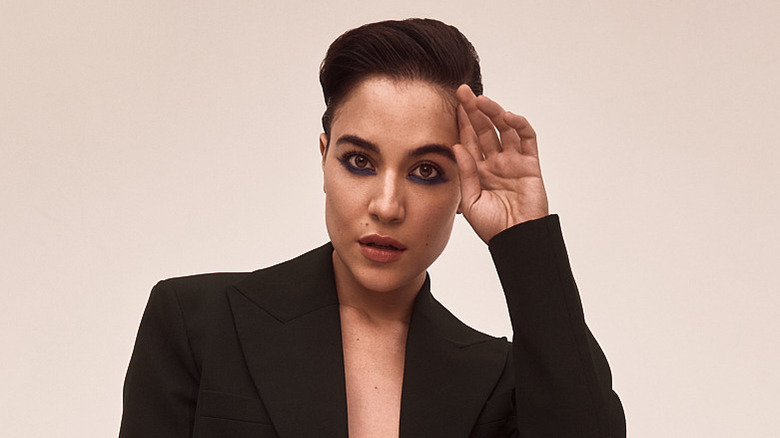Non-Binary 4400 Actor Wilder Yari On Why Representation Matters - Exclusive
Viewers of The CW's "4400" have certainly noticed actor Wilder Yari, who portrays by-the-book Department of Homeland Security Agent Jessica Tanner in the new sci-fi series. Tanner is tasked with investigating and assessing the threat level to national security after 4,400 people mysteriously reappear after having previously vanished without a trace, from different periods in time over the past 100 years. As Tanner continues to investigate, the plot thickens as these returnees — who have no memory of what's happened to them since they disappeared — begin to exhibit extraordinary superhuman abilities.
It's clear that Yari's star is on the rise. Recently seen in the second season of "The L Word: Generation Q," the actor has previously appeared in the 2019 short film "Treacle," which made a splash when it was presented at various film festivals. Meanwhile, Yari's ambitions also extend behind the camera; their feature film script "neem-rooni" was chosen as a semi-finalist for the Sundance Institute's 2021 Creative Producing Lab, and Yari is preparing to direct the project in the near future.
Yari identifies as non-binary and transgender. In an exclusive interview with The List, they candidly discuss the importance of trans and non-binary representation in Hollywood, both on- and offscreen.
Wilder Yari believes hiring trans and non-binary writers can be key
Hollywood has embraced diversity and inclusiveness in recent years, both in front of and behind the camera. As an actor who identifies as trans and non-binary, Wilder Yari has witnessed that firsthand. "T'here's definitely more demand for non-binary roles and trans roles, and that's really amazing," they explained to The List. "But I definitely am noticing that casting and directors and writers are still sort of trying to figure it out. Which is why it's so incredibly important to have non-binary and trans writers behind the scenes, which we actually do on '4400.' Not to just shamelessly plug, but we have three trans writers in the room. And it lends so much to the show."
Describing the increase in trans and non-binary visibility on television as a "groundswell," Yari added, "I think it's really just because it's been sort of one way for so long and there are all of these really interesting stories that have not had a chance to be told yet."
"And it's not just like, 'Oh, people want to see people like them,' which they do," Yari added. "But it's also like ... you don't need to be an immigrant coming to Oklahoma in the 20th century in order to relate to 'Minari.' ... I think it's a really positive moment because you're realizing that like, 'Oh yeah, it's what art is supposed to do.' You're supposed to empathize."
Wilder Yari on how television can educate viewers about trans and non-binary issues
With this increase in trans and non-binary visibility onscreen, notes Wilder Yari, has come an unprecedented opportunity to educate viewers. "I was talking about this in another interview I did recently. Like 80% of people in the United States say they have never met a trans person. So really all you have is representation. And then it just takes its veil off and you understand, 'Wow, these people are actually pretty similar to me.' Or it even opens a door for you to Google. Google is free, you know what I mean? And maybe you're like, 'Oh, I didn't realize that's ... what is hormone therapy?'" Yari explained to The List.
"Just a quick side note: I got into this huge argument with someone relatively recently about hormones. Because we were talking about trans kids and this person was under the impression that it was incredibly easy to get hormones, especially as a young person. And it's not. It's incredibly difficult and not something that medical professionals take lightly, even to the extent that it's pretty difficult to get hormones, especially in some parts of the country. And I think even little tiny things like that are such a powerful opportunity for television to educate, to start conversations, to kind of move the needle along a little bit," they added.
"4400" can be seen Mondays at 9 p.m. ET/PT on The CW.


